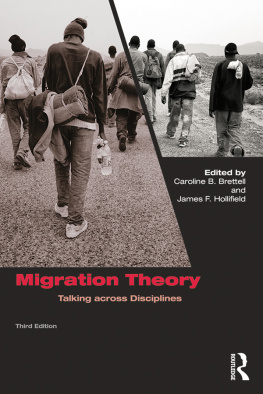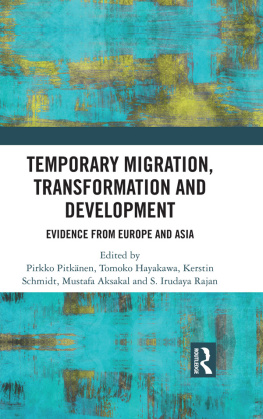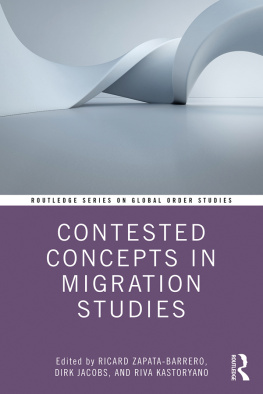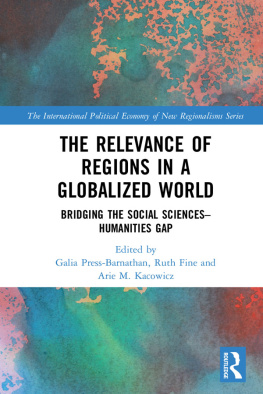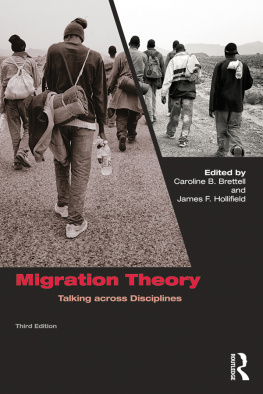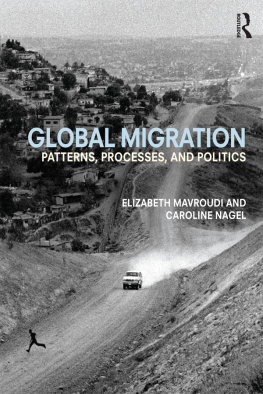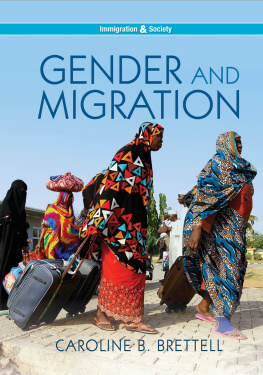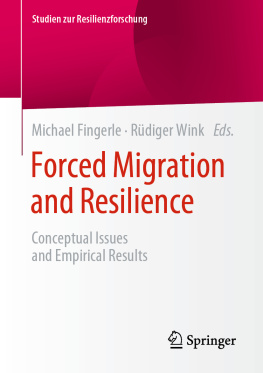Chapter 1
Time and Temporality in Migration Studies
Donna R. Gabaccia
To understand historians participation in cross-disciplinary debates about migration and migration theory, it is helpful to acknowledge some of the habits of mind and practices of scholarship that distinguish history from other disciplines. Far older than most social sciences and dating back to antiquity in both eastern and western cultures, as represented in the works of Chinas Siam Qian and Greeces Herodotus, the documentation and study of the past figured prominently already in Europes humanist universities of the fifteenth century (Grafton 2004). With the subsequent emergence of modern nation states, many historians helped to create what Benedict Anderson (1991) called imagined national communities, often by writing historical narratives that ignored (or forgot) cultural diversity and past conflicts (Renan 1882; Wiborg 2000). Critical, archive-based research came to define a discipline of history in the modern research university at roughly the same time that the modern social sciences coalesced there. Like social scientists, historians have often responded to contemporary developments including the waxing and waning of migratory movements but historians disciplinary expectation that explanations for any phenomenon will inevitably change over time both makes historiography (the history of writing history) a central feature of their disciplinary training and discourages embrace of the most universalizing claims of positivist science (Gilderhus 2009).
History has remained a Janus-faced discipline that interacts as often with and draws theoretically and analytically as broadly from the humanities, arts, and philosophy as from demography, sociology, anthropology, economics, geography, or political science. Interpretation of written and oral texts and visual images connects history to art and literature studies while a respect for empirical evidence (including the material culture used by archaeologists) and methodological eclecticism work to maintain lines of communication between history and the social sciences. Contrary to popular belief, historians today do not work exclusively with archival or print materials; depending on their interests and questions, they may do field work and oral history or analyze data with quantitative methods. Only rarely, however, do historians create the evidence they analyze; they privilege primary sources created in the time period they seek to understand. In recognition of the disciplines complex nature, the National Endowment for the Humanities funds historians research while the National Research Council categorizes history as a social science .
Neither is it exclusively a focus on the past that differentiates history from other disciplines because scholars studying the past work from within all branches of the humanities (e.g. Harris 1994; Greenblatt 1997) and social sciences (e.g. Skocpol 1987; Baker 2007). Instead, it is concerns with time, timing, and temporality, as dimensions of all human phenomena, that most precisely define history as a discipline. For historians, time, timing, and temporality function somewhat in the way space, place, and spatiality do for geographers. Establishing and analyzing chronology, temporal sequencing, contingency and contextualization, and assessments of change or continuity over time, together constitute the heart of the historical method. Historians disciplinary penchant for periodization that is, for slicing the past into analytical segments of time is not just a mechanism for facilitating professional specialization. It is a form of theorization that creates temporal scales of analysis. These temporal scales vary from relatively short ones for example, the decades-long temporalities of birth cohorts or individual biography to centuries-long temporalities of nations and national institutions, political regimes, and ideologies (Rundell 2009) and to the extremely longue dure temporalities of civilizational, ecological, global, world, deep, or big histories (Braudel 1994; Shryock and Smail 2011; Christian 2011). Explanation of any event, of changes in societal structures or processes, or of the significance and meaning of an individual life inevitably differs when analyzed at shorter or longer temporal scales, just as each will be explained differently when examined at differing spatial scales or with hypotheses generated from differing theories. Thus, while it may not trouble social scientists (at least as reported by Hall 2009) that they do not agree on the starting date for their preferred temporal scale the present this lack of clarity certainly would trouble historians.
Both historys Janus-faced opening to two somewhat separate arenas of interdisciplinarity and its theorization of time through periodization shape how historians participate in migration studies. To some historians theory means Foucault, Gilroy, Said, or DeLeuze and Guatari; to others it means Waller-stein, Massey, Glick Schiller, or Pessar and Mahler. While US immigration specialist Hasia Diner (2008: 3132) has observed that most historians eschew theory, her observation seems correct only if theory is defined as the creation of models intended to predict future behavior with the certainty of the natural sciences. If, on the other hand, theorizing means framing general explanations of the causes and consequences of migration, then historians of migration are as thoroughly engaged in theorizing as their counterparts in the social sciences. While they are also avid readers of theory from other disciplines, historians most commonly theorize about migration by periodizing it.
Historians of migration have generally preferred what Nancy Foner (2006) called then to now (or more often then to then) analysis in order to explain changes or continuities in migration patterns, while social scientists have been more inclined to compare a chronologically nonspecific now to a past then (which may or may not be temporally specific). Based on earlier precedents of comparing minority groups then and now (DuBois 1939; Wood 1955; Kindleberger 1965), social scientists studying migrations have recently secured collaboration of history colleagues in comparing nineteenth- and late-twentieth-century migrations (Gerstle and Mollenkopf 2001; Foner and Fredrickson 2005; Lucassen 2005). But while social scientists longitudinal studies (Hatton and Williamson 1998; Cohen 1997; Zolberg 2006) may seem quite similar to historians then to now analyses, social scientific studies of migration have rarely adopted the very long temporal scales of the world and global histories of migration (but see Potts 1990).
In this chapter I treat time, temporality, and periodization as historians major theoretical contribution to migration studies. I first illustrate the temporality of migration studies itself, calling attention to the kinds of knowledge that earlier interdisciplinary collaborations of history and social science have created. I then focus on historical research on migration within the interdisciplinary field over the past half century. Whether they crossed disciplinary boundaries into the humanities or into the social sciences, historians have repeatedly insisted that time matters analytically. Sometimes implicitly and sometimes quite directly, historians challenge ahistorical theorizations of migrations causes and consequences.
Etymological evidence suggests that literate human societies existed for several millennia before they problematized migrants as distinctive objects of scrutiny or study. Only recently have scholars begun to appreciate the earliest efforts in the eighteenth and nineteenth centuries to study migration. For most of the twentieth century, by contrast, the hegemony of US-centered histories of immigration studies pointed almost exclusively to the sociologists of the Chicago School and to the Harvard historian they most influenced Oscar Handlin as the founding fathers of migration studies (Turner 1988; Conzen 1996; Forum 2013). This genealogy suggested that the study of migration radiated outward from the discipline of American sociology first into American history and then, only much later, beyond the paradigmatic American nation of immigrants to the wider world in the years after World War II, a model that David FitzGerald critiques in this volume. As historians of migration abandoned national scales of time and space to examine the longue dure of human migrations around the world, they instead quickly discovered alternative genealogies for their interdisciplinary field.

